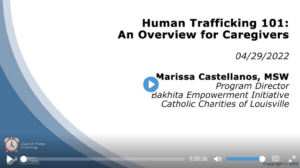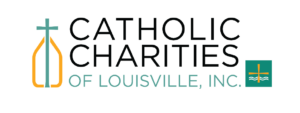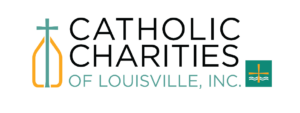Bakhita Empowerment Initiative – Training Institute
Catholic Charities of Louisville, through the Bakhita Empowerment Initiative, has been providing training to professionals across disciplines since 2008, and has provided training for upwards of 30,000 individuals over those 12+ years, averaging 2,500 individuals trained per year. Bakhita is one of the few organizations in Kentucky that offers higher-level training on human trafficking specific topics, including: labor trafficking, guiding principles, and commercial sexual exploitation of children, among others.
Case Management with Human Trafficking Survivors: Trauma and Dissociation
Special Considerations for Foreign National Victims of Human Trafficking
Unaccompanied Minors: Services and Benefits for Minor Victims of Human Trafficking
Screening for Human Trafficking: What needs to be included in screening and protocol development?
Best Practices and Guiding Principles in Providing Services to Victims and Survivors of Human Trafficking
Assisting Human Trafficking Victims and Survivors with Accessing Benefits and Public Assistance
My Life My Choice: A Treatment and Prevention Resource for At-Risk Adolescent Girls
Labor Trafficking: How to Identify and Respond
Human Trafficking 101: Definitions, Overview, Laws, Indicators, and Resources for Victims
Identifying and Responding to Human Trafficking within the Medical Profession
The Intersectionality between Substance Abuse and Human Trafficking-
Child Trafficking in Kentucky: Identification and Response
Dynamics in Support Group Facilitation
Guiding Principles for Agencies is for agencies serving survivors of human trafficking.
The Bakhita Empowerment Initiative represents Catholic Charities of Louisville on the HHS Region 4 Human Trafficking Advisory Group, with membership representing the states of Georgia, Florida, Tennessee, South Carolina, North Carolina, Alabama, and Kentucky. This group worked with regional partners and national organizations to create and revise the Guide for Agencies Providing Services to Survivors of Human Trafficking.
You may download the Guide, with hotlinks, here. If you would like a hard copy, please contact Marissa Castellanos *limited hard copies are available*
Guiding Principles Webinar Series

Webinar Part 2: Implementing the Guiding Principles: Lessons for Policy, Funding, and Practice

Webinar Part 3: A Deeper Dive into the Guiding Principles

COMING SOON
Human Trafficking 101: An Overview for Caregivers
 This training, Human Trafficking 101: An Overview for Caregivers” is part of the Human Trafficking Training Series hosted by DCBS as part of the Improving Outcomes for Child and Youth Victims of Human Trafficking, funded by the Office for Victims of Crime.
This training, Human Trafficking 101: An Overview for Caregivers” is part of the Human Trafficking Training Series hosted by DCBS as part of the Improving Outcomes for Child and Youth Victims of Human Trafficking, funded by the Office for Victims of Crime.


